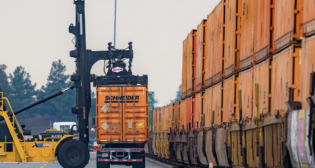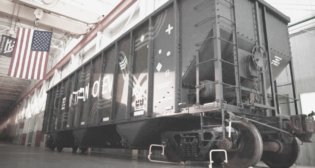
Rockefeller is crossed up on crossties
Written by William C. Vantuono, Editor-in-ChiefJohn D. Rockefeller IV, the Democratic Senator from West Virginia and chair of the Senate Committee on Commerce, Science, and Transportation, has made many efforts to impose new regulations on the railroads that some industry observers say are as onerous as those that existed prior to passage of the Staggers Act. That’s why I view, with some puzzlement, a recent positive statement he made about railroads.
I refer you to the item on p. 6 of our August issue describing how 51 U.S. Senators have co-sponsored a piece of legislation that’s extremely important to the small-railroad industry: extension of the 45G short line rehabilitation tax credit. The Senate’s version of the bill is S.672. Its chief sponsors are Rockefeller and Mike Crapo (R-Idaho).
Rockefeller had this to say about S.672 and his sponsorship:
“West Virginia is the second biggest producer of railroad ties in this country, and rural communities across the state rely on these short line railroads to maintain business and create jobs. This credit has translated directly into jobs, not just for the people of West Virginia, but all across America.”
Thank you, Sen. Rockefeller, for sponsoring this very important piece of legislation. What you said about the railroads maintaining business and creating jobs is quite true.
There are a few points I’d like to add:
• You specifically referred to the fact that West Virginia is a major producer of railroad crossties. That is true.
• You also correctly inferred that extension of 45G would enable small railroads to purchase new ties to improve their rights-of-way.
• The railroads, on average, purchase approximately 20 million crossties per year.
• The vast majority of those crossties are purchased by Class I railroads.
Those Class I’s are the very railroads that you are so passionately attempting to re-regulate with antitrust legislation and other onerous re-regulatory measures that would dilute their pricing power with respect to coal, grain, and chemicals—three major lines of business.
If your efforts on that front are successful, the Class I’s, which annually invest billions of dollars of maintenance and growth capital in their physical plant, may have little choice but to scale back their investment. Undoubtedly, crosstie purchases will be impacted by those scalebacks.
I would think that the companies in your home state that produce those ties will suffer loss of business, and hence, loss of jobs. Aren’t you trying to (as you should) preserve those jobs?
It’s difficult to understand Washington politics as well as the folks that work the trenches on Capitol Hill, getting things done—people like ASLRRA President Rich Timmons, or that most astute lobbyist and NRC President, Chuck Baker of Chambers, Conlon & Hartwell. They are perhaps the most important people behind the 45G extension. Few could do what these people do—that is, deal with the complex, sticky spiderweb (often populated by huge egos) that must be navigated on Capitol Hill.
What must be particularly difficult is figuring out how to deal with someone who is trying to slap and then bind an industry’s right hand while at the same time warmly embracing its left hand.



